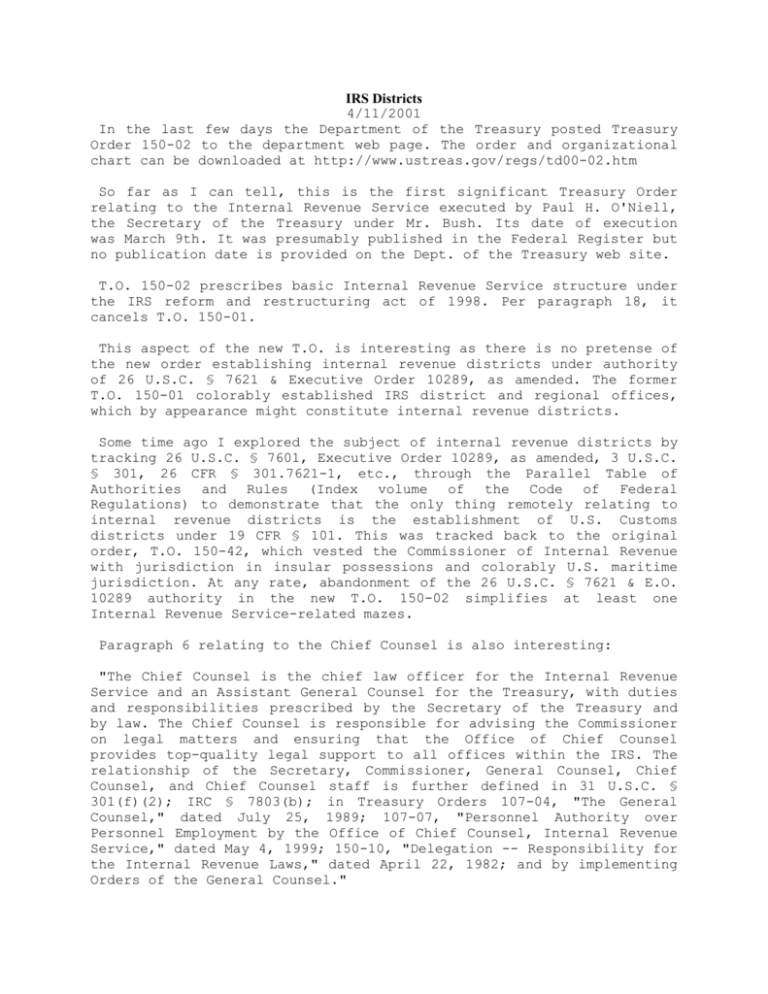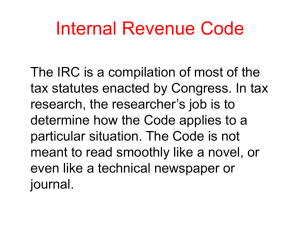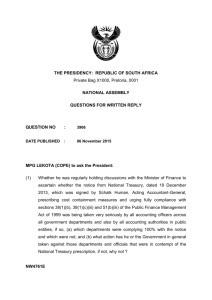IRS Districts
advertisement

IRS Districts 4/11/2001 In the last few days the Department of the Treasury posted Treasury Order 150-02 to the department web page. The order and organizational chart can be downloaded at http://www.ustreas.gov/regs/td00-02.htm So far as I can tell, this is the first significant Treasury Order relating to the Internal Revenue Service executed by Paul H. O'Niell, the Secretary of the Treasury under Mr. Bush. Its date of execution was March 9th. It was presumably published in the Federal Register but no publication date is provided on the Dept. of the Treasury web site. T.O. 150-02 prescribes basic Internal Revenue Service structure under the IRS reform and restructuring act of 1998. Per paragraph 18, it cancels T.O. 150-01. This aspect of the new T.O. is interesting as there is no pretense of the new order establishing internal revenue districts under authority of 26 U.S.C. § 7621 & Executive Order 10289, as amended. The former T.O. 150-01 colorably established IRS district and regional offices, which by appearance might constitute internal revenue districts. Some time ago I explored the subject of internal revenue districts by tracking 26 U.S.C. § 7601, Executive Order 10289, as amended, 3 U.S.C. § 301, 26 CFR § 301.7621-1, etc., through the Parallel Table of Authorities and Rules (Index volume of the Code of Federal Regulations) to demonstrate that the only thing remotely relating to internal revenue districts is the establishment of U.S. Customs districts under 19 CFR § 101. This was tracked back to the original order, T.O. 150-42, which vested the Commissioner of Internal Revenue with jurisdiction in insular possessions and colorably U.S. maritime jurisdiction. At any rate, abandonment of the 26 U.S.C. § 7621 & E.O. 10289 authority in the new T.O. 150-02 simplifies at least one Internal Revenue Service-related mazes. Paragraph 6 relating to the Chief Counsel is also interesting: "The Chief Counsel is the chief law officer for the Internal Revenue Service and an Assistant General Counsel for the Treasury, with duties and responsibilities prescribed by the Secretary of the Treasury and by law. The Chief Counsel is responsible for advising the Commissioner on legal matters and ensuring that the Office of Chief Counsel provides top-quality legal support to all offices within the IRS. The relationship of the Secretary, Commissioner, General Counsel, Chief Counsel, and Chief Counsel staff is further defined in 31 U.S.C. § 301(f)(2); IRC § 7803(b); in Treasury Orders 107-04, "The General Counsel," dated July 25, 1989; 107-07, "Personnel Authority over Personnel Employment by the Office of Chief Counsel, Internal Revenue Service," dated May 4, 1999; 150-10, "Delegation -- Responsibility for the Internal Revenue Laws," dated April 22, 1982; and by implementing Orders of the General Counsel." Researchers should have a heyday with authorities cited in paragraph 6. The first item that should come to memory is that for the Internal Revenue Service is an office in the Treasury. It is the only office relating to the Service acknowledged in Chapter 3 of Title 31, the Treasury organization chapter. the Chief Counsel Department of the Internal Revenue Department of the I've been trying to formulate how to state this so it gets the proper notion across: The Internal Revenue Service is subservient to but is not part of the Department of the Treasury of the United States. On the Department of the Treasury web page, IRS and other related entities, including the Bureau of Alcohol, Tobacco and Firearms, are classified as Bureaus of the Department of the Treasury. However, IRS and BATF are not part of the Department of the Treasury of the United States -- BATF was separated from IRS in the 1970s. T.O. 150-02 establishes the national office, specific positions in the national office, and various lines of authority by classification. Responsibilities within IRS are now more vertical by function than geographical in nature. Through various probes we've learned that former district offices are now territorial offices and former regional offices are now campuses. The office of the district director has vanished. In fact, the former Arkansas-Oklahoma district director, Richard Auby, is now director of the Austin service center. One of the curious authorities in paragraph 6, which is the chief authority IRS hangs its hat on, is T.O. 150-10, which in 1982 succeeded 150-37. Neither of these basic delegations of authority were ever published in the Federal Register in compliance with requirements of 44 U.S.C. § 1505(a). Therefore, application is limited to government under authority of 5 U.S.C. § 301 and territorial jurisdiction in insular possessions, maritime and treaty jurisdictions, the latter three exempt from Federal Register Act publishing requirements. To date we still haven't located anything that gives a comprehensive account of operations at former district and regional offices. It appears that former regional service centers are simply service centers. Dan Meador







